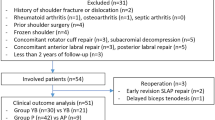Abstract
Purpose
To evaluate the effectiveness of external rotation and active supination CT arthrography in postoperative evaluation by comparing it with neutral CT arthrography and analyzing its agreement with postoperative clinical results after the repair of type II superior labral anterior to posterior (SLAP) lesions.
Materials and methods
A total of 25 patients who had undergone CT arthrography in neutral, external rotation and active supination position at least 1 year after the arthroscopic repair of SLAP lesions were enrolled. Two radiologists independently evaluated the status of the repaired SLAP lesions with neutral CT arthrography and then with external rotation and active supination CT arthrography.
Results
Five patients had residual symptoms and positive findings upon SLAP-specific examinations. Agreements between the presence of symptoms and radiologic diagnoses based on neutral CT arthrography were insignificant for reader 1 (κ = 0.138, p = n.s.) and significant for reader 2 (κ = 0.328, p = 0.027). However, agreements were highly significant in the analysis following the evaluation of external rotation and active supination CT arthrography for both readers (κ = 0.694, p < 0.001 in reader 1; κ = 0.783, p < 0.001 in reader 2).
Conclusions
The presence of contrast-filled gaps between the labrum and glenoid on neutral CT arthrography after SLAP repair is frequent with satisfactory clinical outcomes. Gaps without additional widening upon external rotation and active supination CT arthrography may suggest postoperatively stable biceps anchors, so this new method could minimize the overdiagnosis of recurrent SLAP lesions. Additional gap widening on external rotation and active supination CT arthrography could be related to a true recurrent SLAP lesion and the symptoms of the patients.
Level of evidence
Case series, Level IV.



Similar content being viewed by others
References
Brockmeier SF, Voos JE, Williams RJ III, Altchek DW, Cordasco FA, Allen AA (2009) Outcomes after arthroscopic repair of type-II SLAP lesions. J Bone Joint Surg Am 91(7):1595–1603
Choi JY, Kim SH, Yoo HJ, Shin SH, Oh JH, Baek GH, Hong SH (2012) Superior labral anterior-to-posterior lesions: comparison of external rotation and active supination CT arthrography with neutral CT arthrography. Radiology 263(1):199–205
Denard PJ, Ladermann A, Burkhart SS (2012) Long-term outcome after arthroscopic repair of type II SLAP lesions: results according to age and workers’ compensation status. Arthroscopy 28(4):451–457
Gorantla K, Gill C, Wright RW (2010) The outcome of type II SLAP repair: a systematic review. Arthroscopy 26(4):537–545
Jacobson JA, Miller B, Bedi A, Morag Y (2011) Imaging of the postoperative shoulder. Semin Musculoskelet Radiol 15(4):320–339
Knudsen HB, Gelineck J, Sojbjerg JO, Olsen BS, Johannsen HV, Sneppen O (1999) Functional and magnetic resonance imaging evaluation after single-tendon rotator cuff reconstruction. J Shoulder Elbow Surg 8(3):242–246
Lecouvet FE, Simoni P, Koutaissoff S, Vande Berg BC, Malghem J, Dubuc JE (2008) Multidetector spiral CT arthrography of the shoulder. Clinical applications and limits, with MR arthrography and arthroscopic correlations. Eur J Radiol 68(1):120–136
Maier D, Jaeger M, Ogon P, Bornebusch L, Izadpanah K, Suedkamp NP (2012) Suture anchors or transglenoidal sutures for arthroscopic repair of isolated SLAP-2 lesions? A matched-pair comparison of functional outcome and return to sports. Arch Orthop Trauma Surg 133(2):227–235
O’Brien SJ, Pagnani MJ, Fealy S, McGlynn SR, Wilson JB (1998) The active compression test: a new and effective test for diagnosing labral tears and acromioclavicular joint abnormality. Am J Sports Med 26(5):610–613
Oh JH, Kim SH, Kwak SH, Oh CH, Gong HS (2011) Results of concomitant rotator cuff and SLAP repair are not affected by unhealed SLAP lesion. J Shoulder Elbow Surg 20(1):138–145
Oh JH, Kim SH, Lee HK, Jo KH, Bae KJ (2008) Trans-rotator cuff portal is safe for arthroscopic superior labral anterior and posterior lesion repair: clinical and radiological analysis of 58 SLAP lesions. Am J Sports Med 36(10):1913–1921
Ok JH, Kim YS, Kim JM, Yoon KS (2012) A new technique of arthroscopic fixation using double anchors for SLAP lesions. Knee Surg Sports Traumatol Arthrosc 20(10):1939–1946
Ozbaydar M, Elhassan B, Warner JJ (2007) The use of anchors in shoulder surgery: a shift from metallic to bioabsorbable anchors. Arthroscopy 23(10):1124–1126
Probyn LJ, White LM, Salonen DC, Tomlinson G, Boynton EL (2007) Recurrent symptoms after shoulder instability repair: direct MR arthrographic assessment–correlation with second-look surgical evaluation. Radiology 245(3):814–823
Richards RR, An KN, Bigliani LU, Friedman RJ, Gartsman GM, Gristina AG, Iannotti JP, Mow VC, Sidles JA, Zuckerman JD (1994) A standardized method for the assessment of shoulder function. J Shoulder Elbow Surg 3(6):347–352
Smith DK, Chopp TM, Aufdemorte TB, Witkowski EG, Jones RC (1996) Sublabral recess of the superior glenoid labrum: study of cadavers with conventional nonenhanced MR imaging, MR arthrography, anatomic dissection, and limited histologic examination. Radiology 201(1):251–256
Snyder SJ, Karzel RP, Del Pizzo W, Ferkel RD, Friedman MJ (1990) SLAP lesions of the shoulder. Arthroscopy 6(4):274–279
Tuite MJ, Cirillo RL, De Smet AA, Orwin JF (2000) Superior labrum anterior-posterior (SLAP) tears: evaluation of three MR signs on T2-weighted images. Radiology 215(3):841–845
Vangsness CT Jr, Jorgenson SS, Watson T, Johnson DL (1994) The origin of the long head of the biceps from the scapula and glenoid labrum. An anatomical study of 100 shoulders. J Bone Joint Surg Br 76(6):951–954
Conflict of interest
There is no disclosure and no conflict of interest in this study.
Author information
Authors and Affiliations
Corresponding author
Rights and permissions
About this article
Cite this article
Kim, S.H., Choi, JY., Yoo, H.J. et al. External rotation and active supination CT arthrography for the postoperative evaluation of type II superior labral anterior to posterior lesions. Knee Surg Sports Traumatol Arthrosc 24, 134–140 (2016). https://doi.org/10.1007/s00167-014-3350-5
Received:
Accepted:
Published:
Issue Date:
DOI: https://doi.org/10.1007/s00167-014-3350-5




